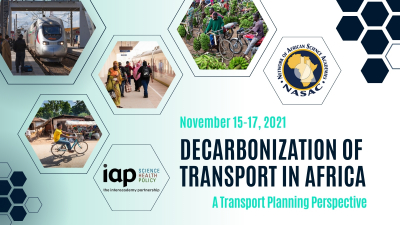


The transport sector is a major source of greenhouse gas emissions globally. While much attention has been placed on the largest emitting economies, Africa is poised to soon become a major new player in the transport sector, with the potential to become a leader in the decarbonisation of transport movement. Leapfrogging fossil-fuelled transportation promises economic, environmental, human health, and infrastructure benefits to African governments and societies.
The InterAcademy Partnership (IAP), along with the Network of African Science Academies (NASAC), will host an online workshop focused on urban and transport planning and public and non-motorized transport considerations in the decarbonisation of transport in Africa, including infrastructure, financing, and policy considerations. This workshop will bring together technical experts, policymakers and other stakeholders to refine the goals and aspects of the upcoming IAP and NASAC joint study of decarbonisation of transport in Africa as well as receive valuable input from local policymakers, practitioners, and other stakeholders. The workshop planning was advised by academy nominated experts from across the continent and supported by the IAP and NASAC secretariats.
“The IAP-NASAC workshop seeks to address key questions that will help governments in Africa harness the economic, environmental and social benefits of decarbonisation of transport, such as: What would it take to accelerate electric vehicle adoption consistent with national climate goals? How can planning and urban design help transform the transport sector? What are the best solutions for rural areas, and for maintaining rural-urban connectivity in an environmentally sustainable manner?,” explained Dr. Bikila Teklu Wodajo, Chair of the Workshop Planning Committee and Chair of Road and Transport Engineering at the School of Civil and Environmental Engineering, Addis Ababa Institute of Technology, Ethiopia.
“Decarbonisation of transport is a critical topic that will benefit from the independent deliberations and advice of merit-based academies and the scientific community across Africa and beyond,” said Prof. Norbert Hounkonnou, President of NASAC and Past President of the Benin National Academy of Sciences, Arts and Letters.
“The 2019 report, Decarbonisation of Transport: options and challenges of IAP’s European regional network, the European Academies’ Science Advisory Council (EASAC) was well received by European Union policymakers. We expect that the planned study on opportunities for decarbonisation of transport in Africa could similarly inform the decisions of policymakers in the African Union, national governments, and development agencies,” added IAP Co-President Sir Richard Catlow.
The IAP-NASAC Decarbonisation of Transport in Africa workshop will run from 1200 - 1500 UTC Monday and Tuesday, 15 and 16 November and from 1200 - 1530 UTC on Wednesday, 17 November 2021. It is timed to directly follow the ‘Sustainable Energy for Africa’ conference organized jointly by the Benin National Academy of Sciences, Arts and Letters (ANSALB) and by the Royal Academy for Overseas Sciences of Belgium (KAOW-ARSOM) on 8-11 November. More information on the Sustainable Energy for Africa conference, including registration information, is available here.
The programme can be viewed here and the concept note is available in English and French. We invite all those interested to register here to participate in the workshop; registered participants will receive a Zoom link.
For more information, please contact Dr. Teresa Stoepler, IAP Secretariat, tstoepler@nas.edu.